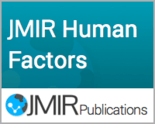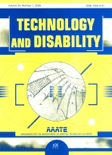
JMIR Human Factors
Scope & Guideline
Enhancing healthcare systems with a focus on human experience.
Introduction
Aims and Scopes
- User-Centered Design and Evaluation:
The journal prioritizes research that employs user-centered design principles, ensuring that digital health tools are tailored to meet the needs and preferences of users, including patients and health care providers. - Digital Health Interventions:
Focus on the development, implementation, and evaluation of digital health interventions, including mobile health apps, telemedicine, and eHealth platforms aimed at improving health outcomes. - Human Factors and Ergonomics:
Research that examines the human factors affecting technology use in health care settings, including usability studies, cognitive load assessments, and the impact of technology on clinician-patient interactions. - Collaboration and Co-Creation:
Emphasis on collaborative approaches involving stakeholders in the design and evaluation processes of health technologies, ensuring that diverse perspectives are integrated into the development of health solutions. - Artificial Intelligence in Health Care:
Exploration of AI applications in health care, including decision support systems, patient monitoring, and the ethical implications of AI in clinical practice. - Health Equity and Accessibility:
Research addressing the accessibility of digital health solutions for diverse populations, focusing on health equity and the barriers faced by marginalized communities.
Trending and Emerging
- Telehealth and Remote Monitoring:
The rise of telehealth services and remote monitoring technologies has become a key area of focus, particularly in the context of the COVID-19 pandemic, as researchers explore their effectiveness and user acceptance. - Mental Health Technology:
There is an increasing emphasis on digital solutions for mental health support, including apps and platforms designed for self-management and therapy, reflecting growing recognition of mental health as a critical component of overall health. - Integration of AI and Machine Learning:
Research exploring the integration of AI and machine learning in clinical decision-making and patient management is gaining momentum, as these technologies offer new opportunities for personalized care. - Social Determinants of Health and Technology Use:
Emerging studies are focusing on how social determinants influence the adoption and effectiveness of digital health interventions, highlighting the need for culturally responsive solutions. - Gamification and Engagement Strategies:
Innovative approaches utilizing gamification to enhance user engagement in health apps and interventions are trending, as researchers seek to leverage motivational techniques to improve health outcomes.
Declining or Waning
- Traditional Health Communication Strategies:
Research on conventional health communication methods is becoming less prevalent, as the focus shifts toward innovative digital communication technologies and platforms. - Generic Usability Studies:
There appears to be a decline in generic usability studies that do not apply specific contextual or demographic considerations, as more nuanced and targeted research gains traction. - Standalone Technology Evaluations:
The journal is witnessing a decline in studies that evaluate technologies in isolation, with a growing emphasis on integrated approaches that consider user experience within broader health care systems. - Single-Method Research Designs:
There is a noticeable reduction in the use of single-method approaches (e.g., surveys or interviews alone), as mixed methods and interdisciplinary approaches are favored for richer insights. - Focus on Older Adults Alone:
Research targeting older adults as a singular demographic is declining, with a broader focus on diverse age groups and conditions becoming more prominent.
Similar Journals

International Journal of E-Health and Medical Communications
Innovating healthcare delivery with cutting-edge technology.Welcome to the International Journal of E-Health and Medical Communications, a pivotal publication designed to bridge the gap between health informatics and computer science applications. Published by IGI Global, this journal serves as a platform for innovative research and insights into e-health technologies, health communication strategies, and the evolving role of digital tools in enhancing healthcare delivery and management. With an ISSN of 1947-315X and E-ISSN 1947-3168, it caters to an audience keen on advancing the intersection of technology and health, as evidenced by its respectable standings in Scopus rankings—positioned in the 64th percentile in Health Informatics and 63rd in Computer Science Applications. Over its publication history from 2010 to 2024, the journal has consistently contributed to significant discussions and advancements within these fields, highlighted by its Q3 quartile ranking in 2023. Join a community of researchers, professionals, and students dedicated to the ongoing exploration of e-health, as we collectively navigate the complex landscape of healthcare innovation.

JMIR Pediatrics and Parenting
Connecting global scholars for impactful pediatric advancements.JMIR Pediatrics and Parenting is a leading open-access journal dedicated to advancing research and practices in the fields of pediatrics, perinatology, and health informatics. Published by JMIR Publications, Inc in Canada, this journal has quickly established itself since its inception in 2018, evidenced by its outstanding categorization in 2023, placing it in the Q1 quartile for Pediatrics, Perinatology, and Child Health, and Q2 for both Biomedical Engineering and Health Informatics. With an impressive Scopus rank of 55/330 in Medicine _ Pediatrics and a percentile rank of 83rd, it attracts a global readership of researchers, professionals, and students seeking to explore cutting-edge findings and innovative strategies in child health and parenting practices. The journal's commitment to open access provides a platform for scholarly communication, fostering collaboration and knowledge sharing among the academic community and contributing significantly to the enhancement of pediatric health outcomes.

TECHNOLOGY AND HEALTH CARE
Integrating Innovation for Healthier FuturesTECHNOLOGY AND HEALTH CARE, published by IOS PRESS, stands as a prominent interdisciplinary journal dedicated to the integration of technology within the healthcare sector. With an ISSN of 0928-7329 and an E-ISSN of 1878-7401, this journal has been a vital resource since its inception in 1993, providing insights and advancements in various categories including bioengineering, biomedical engineering, health informatics, and more. Though it currently holds a Q4 classification in several fields and Q3 in others, it actively contributes to the dialogue surrounding innovative methodologies and practices that enhance healthcare delivery. Researchers, professionals, and students will find the journal invaluable for its diverse range of studies that explore the convergence of technology and health. Its commitment to fostering impactful research continues to reinforce its relevance in the evolving landscape of healthcare technology.

JOURNAL OF MEDICAL INTERNET RESEARCH
Pioneering Insights in eHealth and TelemedicineJOURNAL OF MEDICAL INTERNET RESEARCH, published by JMIR PUBLICATIONS, INC, stands as a pivotal resource in the field of Health Informatics, with an esteemed ranking of #7 out of 138 in the Scopus database, placing it in the top 95th percentile. Since its inception in 1999, this Open Access journal has been committed to disseminating high-quality, peer-reviewed research that explores the intersection of healthcare and internet technologies. With its headquarters in Toronto, Canada, the journal encompasses a broad range of topics, including eHealth, telemedicine, and mobile health innovations. The impact factor and its Q1 quartile ranking highlight the journal's significant influence and prevalence in advancing the understanding of digital health landscapes. Researchers, professionals, and students alike benefit from its valuable insights, making the JOURNAL OF MEDICAL INTERNET RESEARCH an essential tool for fostering informed practices and policy-making in the rapidly evolving domain of health informatics.

JMIR Mental Health
Transforming mental health care through groundbreaking research.JMIR Mental Health is a leading peer-reviewed journal published by JMIR Publications, Inc in Canada, dedicated to exploring emerging topics in the fields of psychiatry and mental health. Since its inception in 2014, this Open Access journal has ensured that groundbreaking research is accessible to a global audience, housing innovative articles that address the critical mental health challenges of our time. With a 2023 impact factor placing it in the Q1 category within psychiatry and mental health and ranking 43rd among 567 journals according to Scopus, JMIR Mental Health is recognized for its significant contributions to academia. The journal’s rigorous peer-review process and commitment to high-quality research make it an invaluable resource for researchers, clinicians, and students aiming to advance their knowledge and practice in mental health. With a focus on interdisciplinary collaboration and the integration of technology in mental health care, JMIR Mental Health is at the forefront of driving innovation and improving mental health outcomes across diverse populations.

TECHNOLOGY AND DISABILITY
Advancing Rehabilitation Through Technological Insights.TECHNOLOGY AND DISABILITY, published by IOS PRESS, is a pivotal journal residing at the intersection of technology, rehabilitation, and health informatics. Since its inception in 1992, this journal has provided a vital platform for disseminating innovative research and findings that focus on the application of technology in addressing the needs of individuals with disabilities. With an ISSN of 1055-4181 and an E-ISSN of 1878-643X, it is recognized for its contributions to the field despite its current Q4 quartile ranking in Biomedical Engineering and Health Informatics, alongside a respectable Q3 ranking in Rehabilitation as of 2023. This ranking reflects a commitment to advancing knowledge in a vital area that impacts many lives. Although the journal is not open access, its comprehensive scope encompasses a range of disciplines making it an essential resource for researchers, professionals, and students looking to explore the ongoing advancements at the nexus of technology and disability. Located in Amsterdam, The Netherlands, TECHNOLOGY AND DISABILITY remains a key publication for those dedicated to improving lives through technology.

Internet Interventions-The Application of Information Technology in Mental and Behavioural Health
Advancing Digital Solutions for Behavioral WellnessInternet Interventions: The Application of Information Technology in Mental and Behavioural Health is a premier Open Access journal published by Elsevier, specializing in the intersection of technology and mental health. With an ISSN of N/A and E-ISSN 2214-7829, this journal provides a platform for innovative research that addresses the burgeoning field of digital mental health solutions. Since its inception in 2014, it has rapidly established significance within the academic community, evidenced by its impressive Q1 ranking in Health Informatics and its 72nd percentile ranking among 138 journals in the same category, as per Scopus metrics. By offering Open Access articles, the journal ensures that research findings are accessible to a wider audience, thereby promoting collaboration and knowledge sharing. Covering a diverse range of topics from online therapy to behavioral monitoring applications, the journal aims to advance academic discourse and practical applications in mental and behavioural health. Engage with cutting-edge research that shapes the future of healthcare technology and impacts real-world practices.

JMIR Cancer
Pioneering discoveries in cancer research and treatment.JMIR Cancer is a premier open access journal published by JMIR Publications, Inc., dedicated to advancing the field of cancer research and oncology. Since its inception in 2015, the journal has become an invaluable resource for researchers, clinicians, and students alike, providing a platform for the dissemination of cutting-edge research and clinical insights. Operating out of Canada, JMIR Cancer holds noteworthy rankings, including a Q3 position in Cancer Research and Q2 in Oncology as of 2023, highlighting its significant contribution to the scientific community. With the journal's open access model, articles are made freely available, ensuring that vital research reaches a wide audience and fosters collaboration across disciplines. By focusing on innovative research, translational studies, and clinical practices related to cancer, JMIR Cancer aims to be at the forefront of knowledge translation and tumor biology, bridging the gap between laboratory findings and patient care.

JMIR mHealth and uHealth
Advancing Mobile Health for a Better TomorrowJMIR mHealth and uHealth is a leading peer-reviewed journal that focuses on the innovative aspects of mobile health (mHealth) and the utilization of technology in health care, published by JMIR Publications, Inc. Since its inception in 2013, this Open Access journal has rapidly established itself as a vital resource in the realm of health informatics, currently ranked #13 out of 138 in the Scopus category of Medicine - Health Informatics, placing it in the top 10th percentile. With a Q1 ranking in Health Informatics for 2023, it is recognized for its high-quality research contributions and significant impact in shaping the future of health technology. The journal serves as an essential platform for researchers, professionals, and students seeking to advance their understanding of how mobile solutions can enhance health outcomes and patient engagement. Accessible to a global audience, JMIR mHealth and uHealth aims to foster collaboration and innovation in the fields of mHealth and uHealth, encouraging the dissemination of research that transforms health care practices.

BMC Medical Informatics and Decision Making
Advancing healthcare through innovative informatics.BMC Medical Informatics and Decision Making is a leading journal in the fields of medical informatics and health policy, published by BMC since its inception in 2001. With an impressive impact factor reflecting its status as a Q1 journal in both Computer Science Applications and Health Informatics, it serves as a vital resource for researchers, professionals, and students dedicated to advancing healthcare through informatics. The journal is committed to disseminating high-quality, peer-reviewed research focused on the innovative use of information technology in healthcare, decision-making processes, and policy formulation. As an Open Access platform, it ensures that findings are widely accessible and can foster collaboration across various disciplines. Positioned at the cutting edge of health informatics, BMC Medical Informatics and Decision Making aims to influence practice and inspire new research directions, making it an essential publication for anyone involved in improving health systems worldwide.